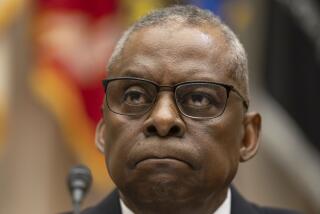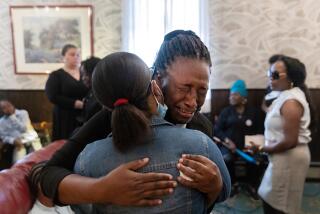Search expands for Ebola patient’s contacts; 4 ordered to stay home
- Share via
Reporting from Dallas — Health officials drastically broadened the scope of their search Thursday for people who might have had contact with an Ebola patient and issued a public health order requiring four people who had shared an apartment with the man to stay inside the home after they ignored earlier orders to not go out.
A bleak image emerged of the apartment in Dallas’ Five Points area where Thomas Eric Duncan spent time before being taken to Texas Health Presbyterian Hospital on Sunday and put into isolation.
His soiled sheets and clothes were sealed in a plastic bag. The mattress he had used was pushed up against a wall.
Health officials were arranging for food to be delivered and scrambled to find a company willing to clean the apartment and remove the items used by Duncan.
“There has been a little bit of hesitancy among entities who want to do that,” David Lakey, the state’s health commissioner, told reporters.
Duncan, a Liberian who arrived in the United States on Sept. 20, remained hospitalized in serious condition. A guard was posted outside his room, and he was not permitted visitors, but Lakey said Duncan had a phone and was talking to relatives and friends.
Questions remained about why Duncan had been sent away from the hospital after his first visit to the emergency room, only to be rushed back two days later sicker than before, and how many people might have been in contact with him before he was hospitalized.
Though officials have repeatedly said the chances of anyone else catching Ebola are extremely low, they upped to 100 the estimated number of people being viewed as Duncan’s potential contacts who should be assessed and possibly monitored for signs of the illness.
Most of those people have been interviewed already, said Thomas Frieden, director of the U.S. Centers for Disease Control and Prevention.
Depending on the level of contact they had with Duncan, they could be advised to remain confined for three weeks — Ebola’s incubation period — and to take their temperatures twice daily for signs of fever. A fever is one of the early symptoms of Ebola, which is spread only through direct contact with the bodily fluids of an infected person.
“Our approach really is to cast a wide net,” Frieden said. “To reach out to as many people as there are who may have had contact so that we may identify all of those who might well have actually had contact.”
So far, nobody, including the ambulance workers who accompanied Duncan to the hospital and the four relatives under confinement orders, has symptoms of Ebola. Five children who were taken out of school Wednesday amid concerns they had contact with Duncan also remain symptom-free.
But the state “disease control order” issued overnight underscored the medical community’s concern that complacency could let the virus that has killed more than 3,000 people in West Africa spread in this country.
It came after officials had advised the four to remain inside their apartment because of what had been their proximity to Duncan.
“They were noncompliant with the request to stay home,” said Dallas County Judge Clay Jenkins, the county’s highest elected official. Jenkins did not provide details, but he said the order was for their own good and that of the rest of the community.
Zachary Thompson, director of Dallas County’s health department, said he and Christopher Perkins, the department’s medical director, had met with the four at the apartment late Wednesday and ensured that they understood the latest order. “They emphatically said they would comply,” Thompson said.
“It is a delicate balance,” Jenkins said when asked whether placing people on virtual lockdown could discourage others from coming forward about possible contacts with Duncan.
“We’re concerned about people feeling there’s an overreaction and not coming forward with their contacts,” he said. “But we’re also concerned with the public losing confidence in the response.”
Officials say they still are trying to determine what went wrong the first time Duncan went to the hospital, on his own, suffering from a low fever and abdominal pain.
On Wednesday, they said a nurse at the hospital correctly asked whether he had been in the area of the African Ebola outbreak, and he confirmed he had. But the diagnostic team that eventually saw Duncan did not get that information. As a result, he was sent home with antibiotics and had two days to possibly spread the virus to others.
Late Thursday, the hospital issued a statement with new details, which it said were being released with Duncan’s permission. He arrived in the ER with a temperature of 100.1 and a headache, but told healthcare workers that he did not have nausea, vomiting or diarrhea, the statement said.
“When Mr. Duncan was asked if he had been around anyone who had been ill, he said that he had not,” the hospital said.
Duncan disclosed that he had been in Africa, and the nurse entered that information “in the nursing portion of the electronic medical record.” But, the hospital statement continued, there are “separate physician and nursing workflows.” The travel history was in the nursing portion but “would not automatically appear in the physician’s standard workflow.” The hospital said it had changed the workflows to prevent that from happening again.
Earlier Thursday, in North Carolina, Duncan’s nephew, Joseph Weeks, said he was deeply disturbed when he learned his uncle had been sent home after the first hospital visit.
“I was terrified. Worried. Scared. All of the above,” Weeks, 43, said outside his home in Kannapolis. Weeks said he suspected his uncle had contracted Ebola virus in Liberia before he flew to Dallas to attend his son’s graduation.
Weeks said he called the CDC in Atlanta to report his concern.
Frieden, of the CDC, later said at a news conference that he was not aware of such a call.
Weeks said he speaks with Duncan twice a day and that his uncle’s spirits were lifting. “He’s still suffering. He is still in pain and he’s still hurting,” he said.
Assuming his uncle recovers, Weeks said, “I’ll be there to shake his hand and give him a hug.”
Frieden said that since the Ebola outbreak began in Africa, the CDC had received 100 inquiries from 34 states concerned they might have a patient who had been exposed to the disease.
Of those, officials determined through travel histories and other information that 15 needed to be tested. So far, only Duncan has tested positive.
Several lawmakers have raised questions about the screening of travelers from West Africa, the preparedness of hospitals in the U.S. and other issues related to the disease.
Republican Sen. Rob Portman of Ohio called for more aggressive checking of airline passengers, saying all travelers from affected areas should be questioned about their exposure to Ebola.
Hennessy-Fiske reported from Dallas, Susman from New York and Zucchino from Kannapolis, N.C.
More to Read
Sign up for Essential California
The most important California stories and recommendations in your inbox every morning.
You may occasionally receive promotional content from the Los Angeles Times.













